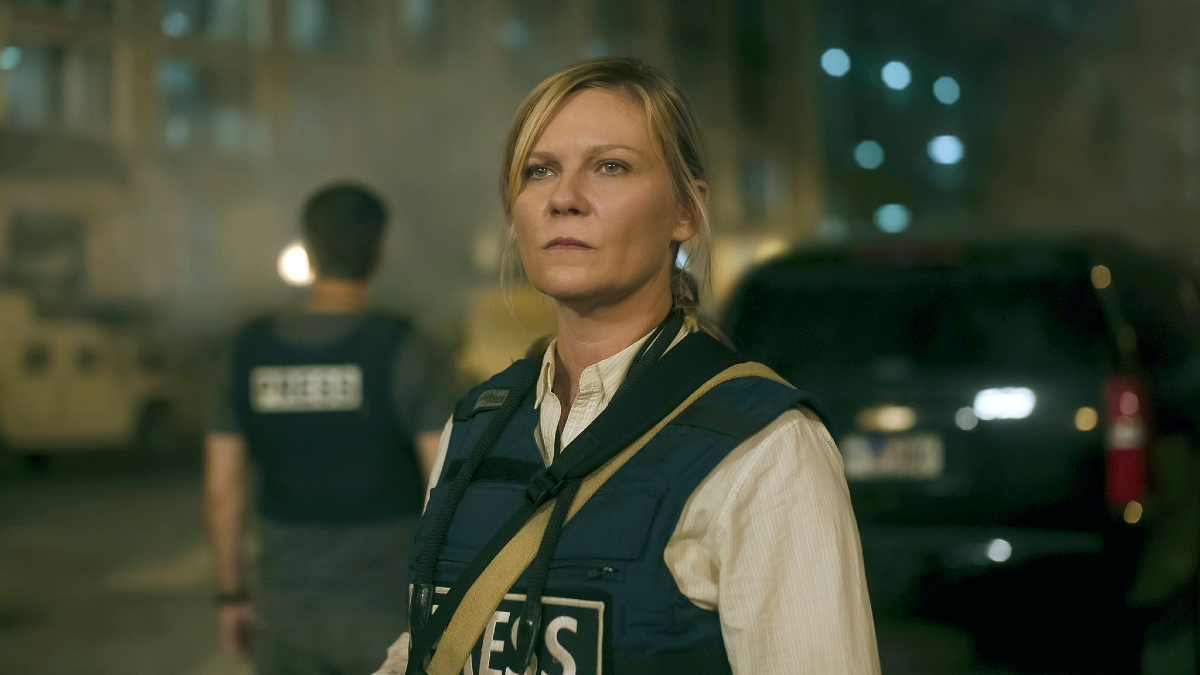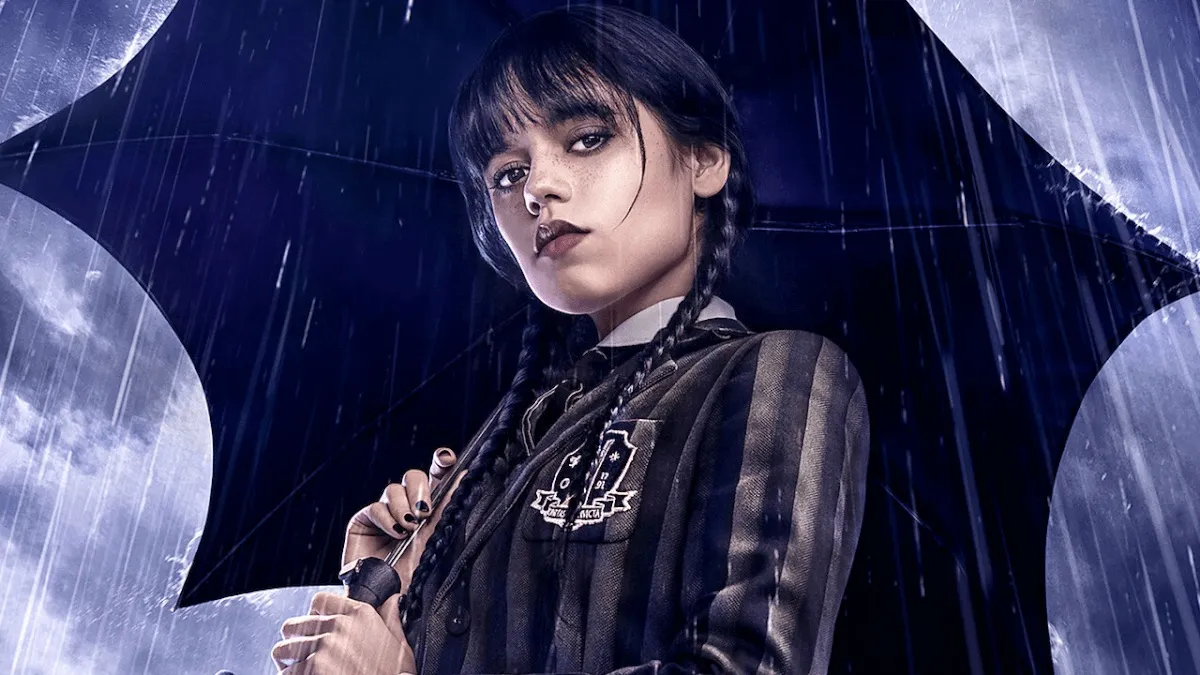With Civil War, filmmaker Alex Garland doesn’t have to cast his gaze very far to envision a dystopian America in which political divisions have given way to violent conflict. We don’t need to, either.
But critics of the film are dismissing it—and Garland—for refusing to detail the origins of this particular war and the contrasting political ideologies that motivated it. We don’t need Civil War to explain why this war is happening. We already know why. We’re living in it.
Civil War is both a road movie and a harrowing wartime drama told from the perspective of four journalists: hardened war photographer Lee (Kirsten Dunst), thrill-seeking Reuters reporter Joel (Wagner Moura), their mentor Sammy (Stephen McKinley Henderson), and aspiring photographer Jessie (Cailee Spaeny). Riffing on a familiar dynamic typically explored through male characters, Lee is the experienced old gun who begrudgingly takes Jessie under her wing on a road trip from Tennessee to Washington, D.C., where they hope to document the moment when America’s fascist three-term president (Nick Offerman) is captured—or killed.
On its surface, Civil War is markedly different from Garland’s other directorial efforts (unless you remember that he ghost-directed Dredd). But what makes this film so effective is the same quality that powers his other films: tangibility. Civil War looks and feels possible in the same way Ex Machina does, in the same way that Annihilation pulls off its cosmic horror, and, to some extent, in the same way that Men uses familiarity as a springboard for batshit folk horror. Our ability to identify with Garland’s protagonists, whose emotional instability is often seen as a liability in their given circumstances, is what makes his films so visceral and thought-provoking. And Civil War is no exception.
Crucial to the film’s efficacy is the absence of political labels and ideological signifiers. By telling the story of Civil War through the eyes of journalists, whose job it is to observe, document, and report, Garland comes as close as possible to achieving objectivity in an inherently subjective medium. And he does so in the service of emphasizing a crucial component of the viewing experience: our ability to empathize. It isn’t just that film is an inherently subjective medium; it’s that objectivity isn’t a natural occurrence. Reporting the news of the world requires constant mindfulness to maintain emotional distance from the subject at hand. Kirsten Dunst’s Lee has a practiced indifference, but she can’t unlearn her own humanity, as evidenced in the film’s climactic scene, when the post-traumatic stress from decades of witnessing violent atrocities consumes Lee at a crucial moment. Here, Garland acknowledges the burdens of such journalism and the paradox of being an objective witness. It also makes Lee, whose success is dependent upon her stoniness, more relatable than she’s been at any other point in the film. And it makes what happens after that even more upsetting.
In order for Civil War to work as a narrative film, it needs protagonists the audience can hold onto, especially when all hell breaks loose. We need to relate to these people on an essential level, something that has become nearly impossible to do in the real world, where political disagreements are no longer about which nominee will be most effective in an administrative role, or which party better serves the needs and interests of the population. What politics ought to be about and what they are actually about are two very different things. It’s no longer a matter of choosing the best person for the job because so many of our politicians have become tethered to ideologies that have little to do with bureaucracy and the administration of government, and more to do with religion, identity, sexuality, and sex—which isn’t to say that one side doesn’t have more explaining to do than the other, but overcoming this polarity requires what is necessary of the same on a molecular level: meeting in the middle. Not compromising our beliefs, but meeting each other in a neutral zone comprised of our commonalities, emphasizing what we share and exploiting what makes us similar rather than what makes us different.

During a recent interview following the SXSW premiere of Civil War, Garland clumsily gestured at a similar line of thinking. “Why are we talking and not listening?” Garland wondered. “We’ve lost trust in the media and politicians. And some in the media are wonderful and some politicians are wonderful—on both sides of the divide. I have a political position and I have good friends on the other side of that political divide. Honestly, I’m not trying to be cute: What’s so hard about that? Why are we shutting [conversation] down? Left and right are ideological arguments about how to run a state. That’s all they are. They are not a right or wrong, or good and bad. It’s which do you think has greater efficacy? That’s it. You try one, and if that doesn’t work out, you vote it out, and you try again a different way. That’s a process. But we’ve made it into ‘good and bad.’ We made it into a moral issue, and it’s fucking idiotic, and incredibly dangerous … I personally [blame] some of this on social media. There is an interaction that exists human-to-human that floats away when it reaches a public forum.”
It was this quote, and not Garland’s other, more eloquent thoughts on American exceptionalism and the nature of his films, that attracted the most attention online. Numerous publications (including ours) ran stories criticizing Garland for “both-sidesing” the political divide, and they are well within their right to do so (especially considering that he literally used the phrase “both sides”). I don’t entirely agree with Garland, either, but focusing—and capitalizing—on the most divisive thing he said only serves his point. The only reason to republish that part of the interview is because it’s divisive. It’s the same line of thinking that informs much of our online behavior and shapes both the content we create and the content we are served. Indignation and outrage are conducive to activity, whereas acknowledging and civilly disagreeing with an opposing point of view is seen as passive and therefore weak.
Garland made another, better point in that same interview, when he noted that the political divides in the U.S. are quite similar to those in other industrialized countries. “In the case of America, there’s an extra danger given its power and importance in the world,” Garland explained. “America has an internal concept in its exceptionalism that means it feels it’s immune to some kinds of problems. One of the things history shows us is that nobody is immune. Nobody is exceptional. And if we don’t apply rationality and decency and thoughtfulness to these problems, in any place, it can get out of control.”
Politics are obviously central to the experience of Civil War, and Garland is keenly aware that he isn’t releasing this film in a vacuum. But to accuse it or Garland of being apolitical in a harmful sense is disingenuous. In watching Civil War, if we are ideologically aligned with one side over the other, then we’ve decided who the good guys are, and anything they do or have done becomes morally justified. The problem with this line of thinking is that, in actuality, there is no justification—political or otherwise—for war itself. And if you believe that, as I do, then having uncomfortable conversations about the issues we most passionately disagree on is a small inconvenience to endure for the sake of avoiding mass violence. Those looking for ideological clarity in Civil War, a movie in which the only stance—war is fucking horrible and should be avoided—is arguably unimpeachable, are casting about for justification that simply does not exist, and looking to assign blame in a scenario where doing so is useless.
If you want to know why there’s a civil war in Civil War, look around you. Our refusal to engage with opposing viewpoints, no matter how demonstrably harmful and morally reprehensible those viewpoints may be (and often are!), is not progressive. We cannot engender change through willful ignorance, tempting as it may be. It’s easier, of course, to identify a bad person based on their actions and beliefs, and choose not to engage with them. It’s understandable when we do so from a desire to avoid platforming hateful ideologies. We can withhold light and oxygen, confident in the logic that without them, these ideas cannot take root or grow. But when you push them underground, they adapt and find new ways to proliferate. Ignoring hateful ideologues and casting them aside doesn’t eliminate the problem. Avoidance is the essence of polarity.
(featured image: A24)










Published: Apr 12, 2024 04:10 pm